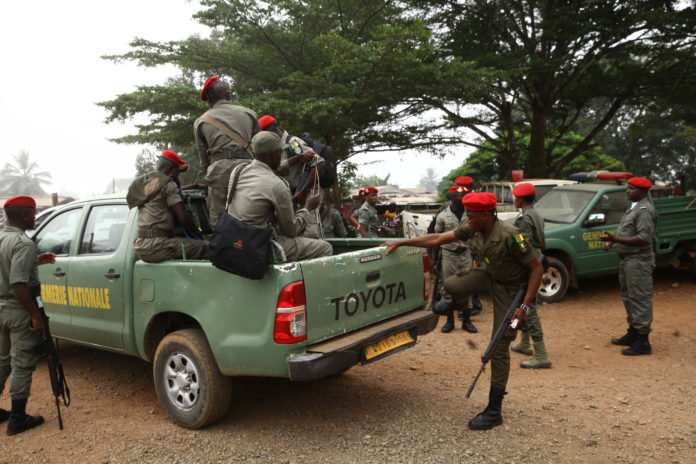The government of Cameroon is under intense pressure to account for and punish those responsible for the killing of at least 22 people in Ngarbuh – Ntumbaw village. The killings which rights groups have described as a “massacre” were carried out on February 14, 2020, in the North West region; one of two English-speaking regions which has experienced an uptick in violence since 2017.
Fresh fighting between ruthless government troops and indefatigable armed separatists saw the killing of no fewer than 15 children, majority of them below the age of five. Two pregnant women were also killed when houses went on fire, witnesses said.
The UN High Commission for Human Rights has described the killing as “a shocking episode,” calling on the government to carry out investigations and punish perpetrators. “We urge the authorities to ensure that the investigation is independent, impartial and thorough and that those responsible are held fully to account,” Rupert Colville, Spokesperson for the UN High Commissioner for Human Rights said.
The UN agency also urged the government to make sure security forces respect international law during the conduct of their operations and refrain from deliberately attacking civilians. António Guterres, UN Secretary-General has expressed concerns over the killings.
Nkongho Felix Agbor, Executive Director of the Center for Human Rights and Development in Africa put the responsibility of the atrocity at the doorsteps of the government. “The military officers responsible for these heinous crimes must be brought to justice. These crimes clearly amount to crimes against humanity,” he underscored. Nkongho expressed discontent over a culture of impunity reigning in the country.
The lawyer of international repute posted on Facebook on February 17, 2020, that the death toll from the massacre in Ngarbuh – Ntumbaw had hit 32, while others remain missing.
Cameroon’s largest opposition party, the Social Democratic Front (SDF) has condemned the mass killing. “In the name of justice that has to be rendered in the name of the Cameroonian people who have an absolute right to the truth, we hereby ask the powers that be to have the miscreants that perpetrated and ordered for these murders to be brought to justice,” Joshua N. Osih, the party’s First National Vice President said in a statement.
According to Akere Muna, an opposition figure who challenged long-serving President Paul Biya in the 2018 elections, suffering, death and killing are now the new normal. “How did we get here where human life no longer has any value?” he wondered, expressing the wish that a pathway to peace is sought before Cameroon loses its soul.
Other prominent political, religious and civil society activists, including Biya’s main challenger, Maurice Kamto, and the Commonwealth Secretary-General Patricia Scotland, have added their voice in condemning the killings. They have all pushed for an inquiry into the atrocity. Some observers hold that should the government be allowed to investigate a crime it is accused of committing, the findings are likely going to be partial.
Painful Death
Locals told reporters that the incident occurred when over two dozen men clad in military fatigues stormed the village early morning and started shooting indiscriminately. Then a fire broke out which killed women and children trapped in some nine houses.
Initially, the government did not make any official statement on the incident. Then, three days after, following an outcry by the national and international community, the government acknowledged the incident had happened, but downplayed it. Joseph Beti Assomo, Minister of Defense said the incident was collateral damage which resulted in the death of four children and one woman.
According to Rene Emmanuel Sadi, Minister of Communication, the fire which killed the woman and children was the outcome of an explosion when six-state security operatives were in a firefight with separatists.
“During the clashes that took place, a fire broke out in a fortified shelter that contained explosives and flammable material stored by the armed rebels. This let to blasts, followed by tongues of fire that eventually spread and reached nearby dwellings,” Sadi claimed at a press conference in the capital Yaounde on February 18, 2020.
It is not the first time Cameroon is denying its army carried out unlawful killings. Some military men are standing trial after a video emerged in 2018 in which they were seen carrying out extra-judicial killing of two women and two children in the north of the country. The government initially denied the accusations, labeling it as “fake news”, before making a U-turn to admit the involvement of its troops.
The latest deadly incident adds to multiple others in the drawn-out socio-political conflict in Cameroon’s English-speaking regions. Local monitors put the tally of the deaths at over 3,000, with more than half a million people internally displaced and over 80,000 living under deplorable conditions as refugees in next-door Nigeria.
The conflict broke out following the real and perceived marginalization of the minority Anglophones by the Francophone-dominated government. Initial peaceful protests started in 2016. But instead of responding to the grievances with tact, the Biya government employed force to quash dissent. The mass protests turned violent in 2017 and have since then been escalating.
The government seems not to be ready for a political solution to end the crisis, opting for a military option year-in, year-out.

